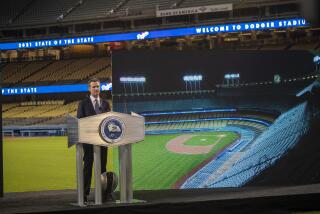It’s Official: State to Get Poet Laureate
SACRAMENTO — California has an official state rock (serpentine), an official state motto (“Eureka,” yelped by lucky gold miners), and even an official state insect (the dogface butterfly).
So why not, wondered a legislator from Agoura Hills, crown an official state poet?
Assemblywoman Fran Pavley set out to do just that with a bill establishing the post of California Poet Laureate. On Saturday, Gov. Gray Davis announced he had signed AB 113, adding California to a list of about two dozen states that boast their own poet-in-chief.
“The bill sends an important signal that Californians not only value their economic assets but treasure their literary culture as well,” said Roger Salazar, a Davis spokesman.
While Pavley’s bill formalizes the post of poet-in-chief and defines its duties, California has been served periodically by poets laureate throughout this century. The last one, Charles B. “Gus” Garrigus, had the job from 1966 until his death about a year ago.
But artists say the selection of previous state poets often had more to do with whom you knew than your literary gifts. When Garrigus--a former assemblyman--was chosen by fellow legislators, for example, howls of protest rose from poets who smelled politics. None of Garrigus’ works, they noted, had ever been published.
“He wouldn’t know an ode if it hit him in the face,” griped an official of one poetry society that fought his appointment.
Lawrence Ferlinghetti, dean of the Beat Generation poets, said the Garrigus episode proved that the naming of poets laureate “used to be like a plum [that politicians] would pass around to each other.”
“We need a real nominating process, one that relies on the wisdom of literary organizations around the state,” said Ferlinghetti, the former poet laureate of San Francisco.
New Poet-in-Chief Also Subject to Term Limits
Under Pavley’s bill, nominees will be gathered by a panel of three literary experts, which will forward a trio of finalists to the governor. His choice will require confirmation by the state Senate.
Nominations will come from college literature departments, poetry societies, booksellers and other sources. The winning scribe must have lived in California for at least 10 years and be a prominent poet with a significant body of published work.
To allow for a diversity of voices, he or she would be subject to term limits--no more than two two-year terms.
While the poet laureate position is prestigious, the pay is not--a modest stipend and expenses to be covered by the California Arts Council. Stationery bearing the state seal and title “California Poet Laureate” will probably be provided too.
Just how the poet laureate chooses to spread the virtues of verse to Californians remains somewhat undefined. Garrigus wrote scores of poems when he wore the laureate’s hat, many of which were etched in stone to dedicate dams and aqueducts, honor colleges and salute prominent citizens.
On the national level, the U.S. poet laureate often speaks at inaugurations and events for visiting dignitaries. One even wrote a weekly syndicated newspaper column on poetry.
Pavley’s bill requires California’s top poet to give at least six public readings and urges him or her to devote extra attention to California schoolchildren.
“Many times poetry can reach students you can’t reach through more traditional academic approaches,” said Pavley, a middle school teacher for 20 years. “They need exposure to it, just like music and other art forms.”
With the governor’s signature on the bill, the arts community will no doubt begin buzzing about who might get the nod and don the laureate’s robe. There is certainly no shortage of poetic talent in the Golden State.
Will it be Pulitzer Prize-winning, eco-Zen poet Gary Snyder? Or maybe Robert Hass, the former U.S. poet laureate?
Polish literary giant Czeslaw Milosz would qualify, having lived in California for more than 40 years. And then there’s Fresno Pulitzer winner Philip Levine, once called the preeminent poet of working life.
Salazar could not say whether Davis has any poetic preferences: “At this point, I’d say it’s wide open.”
More to Read
Sign up for our Book Club newsletter
Get the latest news, events and more from the Los Angeles Times Book Club, and help us get L.A. reading and talking.
You may occasionally receive promotional content from the Los Angeles Times.









